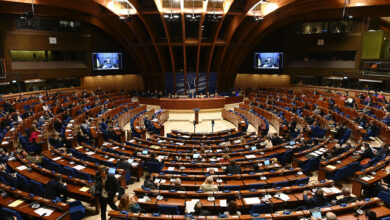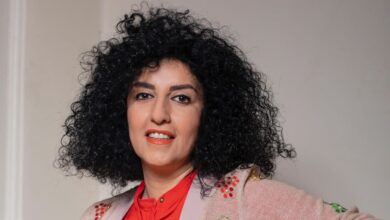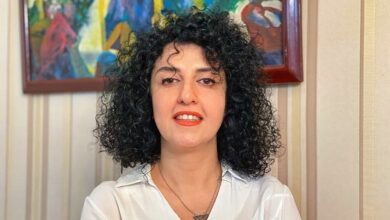Despite drastic changes to the composition of the semi-autonomous National Council for Human Rights (NCHR), many are skeptical of the council's ability to quickly turn from a state propaganda tool into an institution that can effectively advocate for human rights in Egypt.
Deputy Prime Minister Yehia al-Gamal issued a decision on 12 April replacing the council’s vice president, Mokbel Shaker, a member of Hosni Mubarak’s National Democratic Party (NDP), with former Minister of Information Mohamed Fayek. Some of the additional 25 members of the board were changed, though the president of the NCHR, Boutros Boutros-Ghaly, kept his job.
The council was founded in 2003 as a subsidiary of the Shura Council, which appoints its members every three years. The president is empowered to summon the council for meetings and to assign it topics for research.
Past incarnations of the NCHR included only representatives affiliated with the ruling regime. The new group features those identified with the opposition under Mubarak and the pro-democracy uprising that brought him down.
George Ishaq, a member of the pro-democracy National Association for Change and a founding member of the pro-democracy group Kefaya, is now part of the NCHR, as is Osama al-Ghazaly Harb, who heads the Democratic Front Party. For the first time the council includes trusted jurists, such as Adel Koura and Adel Abdel Hamid. Respected researchers Amr Hamzawy and Amr al-Shobaky are also now part of the board.
But the inclusion of some pro-democracy figures may not be enough to satisfy true human rights activists.
Many human rights organizations rejected keeping Boutros-Ghaly, who has headed the council through its unsatisfactory performance over the last eight years and was also a member of the NDP.
Other NDP-affiliated figures, most prominently Hazem Mounir, the former editor-in-chief of the state-owned Rose al-Youssef magazine, also remain on the council’s board. Mounir was reportedly close to the president’s son, Gamal, and helped plan for his succession to the presidency.
Wael Kandil, a columnist for the independent newspaper Al-Shorouk, called Mounir’s appointment “a moral crime” and wrote that the council’s new formation shows contempt for and is an insult to the revolution and its martyrs.
Emad Mubarak, the head of the Association of Freedom of Thought and Expression, a human rights NGO, labeled as “incomprehensible” the decision to keep Boutros-Ghaly. But Mubarak’s criticism goes deeper.
“The new formation doesn’t give a clear indication of the council’s direction in the coming period,” he says, noting that while the new council includes figures from a variety of fields, there are not many from the human rights advocacy community.
“Is it political, is it human rights oriented, or is it academic?” says Mubarak.
“The new formation includes figures who became known recently. It was only meant to satisfy the people,” he speculated.
Mubarak said that, regardless of its new composition, the council will not be able to perform satisfactory until it becomes independent from the government and its recommendations become mandatory rather than advisory.
With the Shura Council and the NCHR’s board dominated by members of the ruling party, the council was long seen as a decorative measure used by the government to ease the international community’s concerns about human rights in Egypt. The Egyptian government has come in for regular criticism from international human rights organizations, foreign governments, and international institutions for human rights abuses, from torture to religious discrimination to restrictions on free speech.
Hafez Abou Seada, the head of an independent human rights NGO and a member of the NCHR who was recently reappointed, says that the council previously had strong, unbiased positions on certain issues. He admits, however, that the existence of NDP figures within the body created internal conflicts, resulting in the failure to publish some of the council’s anti-government findings.
“The council issued a very strong report about electoral fraud in the last parliamentary elections, but its vice president, who was a member of the NDP, refused to release it," Abou Seada says.
Though fraud was well-documented in the November elections, the NCHR’s head told a British newspaper that the elections met international standards and that their positives outnumber their negatives.
Doreya Sharaf al-Din, a prominent media figure who recently joined the council is optimistic that the role of the council will change in the future.
“We hope that the council will have a practical and positive role and will issue decisions that are applicable and in harmony with the Egyptian street, and to make the Egyptians feel like they have a national council that looks out for their best interests, and not a piece of décor placed by the government,” said Sharaf al-Din.
But there are legal impediments to the council fulfilling the role that she envisages.
According to Law 94/2003 regulating the activities of the council, the body’s authority is limited to providing the government with plans for regulating human rights, giving recommendations and receiving human rights complaints and passing them on to the specialized institutions.
Abou Seada and Mubarak, both members of the council, agree that its laws should be changed to give it more power.
Abou Seada said that the council’s role in responding to the citizens’ complaints is that of a postman, as all it is entitled to do is to refer the complaints to other institutions. He demanded the formation of an investigative body in every ministry to address these complaints.
“Before the revolution, there were no taboos, but our voice wasn’t heard and our recommendations were not taken into consideration. We need to have the power to intervene legally,” said Abou Seada.
The council has already formally requested more legal empowerment to influence legislations and to monitor the government.
“Our role in this phase is to ensure that in the new state there will be a rule of law, democracy and a respect for human rights,” said Abou Seada, outlining the council’s priorities in the coming period.




